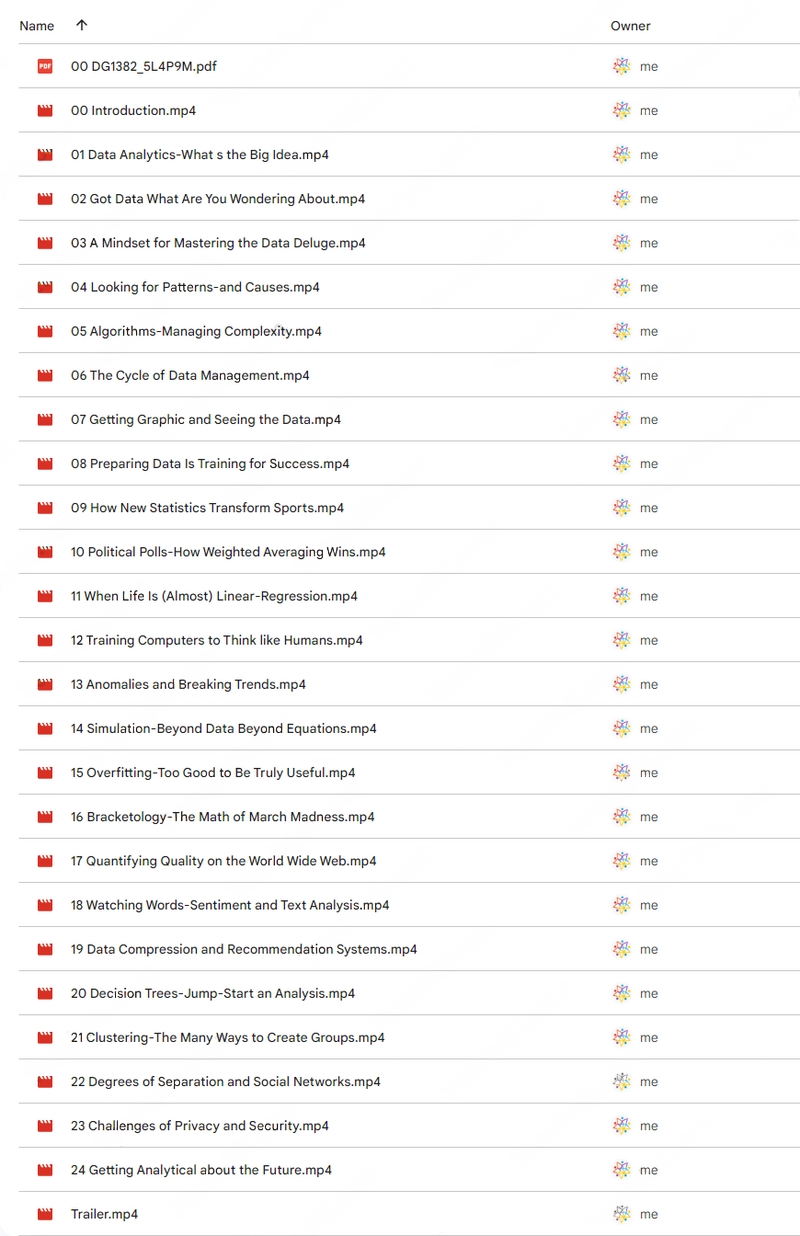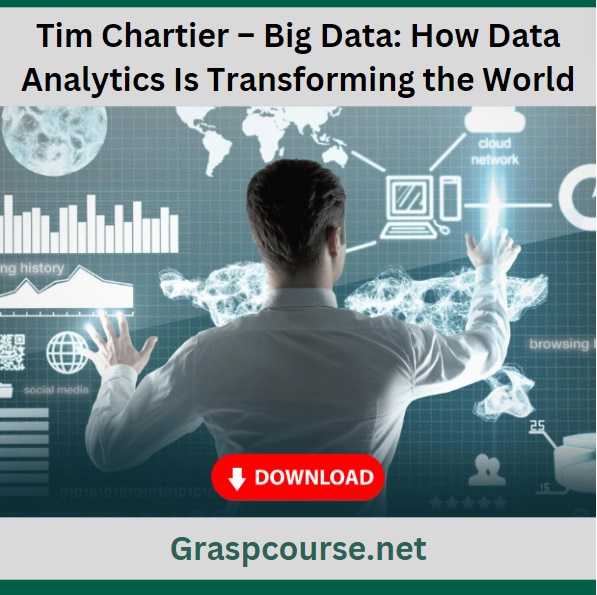Tim Chartier – Big Data: How Data Analytics Is Transforming the World
$235.00 Original price was: $235.00.$54.00Current price is: $54.00.
Tim Chartier Big Data: How Data Analytics Is Transforming the World Course [Instant Download]
📚 PROOF OF COURSE

1️⃣. What is Big Data: How Data Analytics Is Transforming the World:
“Big Data: How Data Analytics Is Transforming the World,” taught by the esteemed Professor Tim Chartier, unveils the profound capabilities of data analytics. This course provides a panoramic view of how voluminous data sets, when meticulously analyzed, reveal patterns and insights that are transforming industries, from healthcare and sports to business and governance.
Through engaging lectures, Professor Chartier demystifies the complex techniques of data analytics, making them accessible to individuals at all levels of technical expertise. The course not only equips you with the tools to understand data analytics but also empowers you to apply this knowledge to make informed decisions and drive significant advancements in your field of interest.
By exploring a variety of real-world examples, including predictive models for sports performances and election outcomes, this course illustrates the dynamic role of data analytics in deciphering the vast information our world compiles daily.

2️⃣. What you will learn in Big Data: How Data Analytics Is Transforming the World:
In “Big Data: How Data Analytics Is Transforming the World,” you will learn:
- Fundamental Concepts: Grasp the basic principles of data analytics, including data collection, processing, and interpretation.
- Analytical Tools and Techniques: Explore various data analytics tools and methodologies used to extract meaningful information from large datasets.
- Real-World Applications: Discover how data analytics is applied across different sectors such as sports, healthcare, and public policy to solve real-world problems.
- Predictive Analytics: Understand how to use data to forecast and influence future outcomes effectively.
- Data-Driven Decision Making: Learn to make strategic decisions by analyzing and interpreting complex data sets.
This course is structured to provide comprehensive knowledge and practical skills that will help you leverage data analytics in your personal and professional life.
3️⃣. Big Data: How Data Analytics Is Transforming the World Course Curriculum:
- Module 01: Data Analytics-What’s the Big Idea
- Module 02: Got Data What Are You Wondering About
- Module 03: A Mindset for Mastering the Data Deluge
- Module 04: Looking for Patterns-and Causes
- Module 05: Algorithms-Managing Complexity
- Module 06: The Cycle of Data Management
- Module 07: Getting Graphic and Seeing the Data
- Module 08: Preparing Data Is Training for Success
- Module 09: How New Statistics Transform Sports
- Module 10: Political Polls-How Weighted Averaging Wins
- Module 11: When Life Is (Almost) Linear-Regression
- Module 12: Training Computers to Think like Humans
- Module 13: Anomalies and Breaking Trends
- Module 14: Simulation-Beyond Data Beyond Equations
- Module 15: Overfitting-Too Good to Be Truly Useful
- Module 16: Bracketology-The Math of March Madness
- Module 17: Quantifying Quality on the World Wide Web
- Module 18: Watching Words-Sentiment and Text Analysis
- Module 19: Data Compression and Recommendation Systems
- Module 20: Decision Trees-Jump-Start an Analysis
- Module 21: Clustering-The Many Ways to Create Groups
- Module 22: Degrees of Separation and Social Networks
- Module 23: Challenges of Privacy and Security
- Module 24: Getting Analytical about the Future
4️⃣. Who is Tim Chartier?

Tim Chartier is an esteemed Joseph R. Morton Professor of Mathematics and Computer Science, renowned for his profound expertise in data analytics and sports analytics. Holding a Ph.D. from the University of Colorado, Boulder, and undergraduate and master’s degrees from Western Michigan University, Professor Chartier has established a robust academic and professional foundation.
Throughout his illustrious career, Tim has collaborated with prestigious organizations, including NBA, NFL, and NASCAR teams, providing advanced analytics that significantly enhance team strategies and performance. His work has not only garnered attention from sports entities but also respected media outlets like ESPN and The New York Times.
As an author, Professor Chartier has contributed significantly to the field of mathematics and data analytics through his publications with Princeton University Press and the Mathematical Association of America. His books, such as “Math Bytes” and “When Life is Linear,” have received critical acclaim and prestigious awards, including the Euler Book Prize and the Beckenbach Book Prize.
At Davidson College, he leads a vibrant team of up to 100 student researchers, directing projects that span across various domains of data analytics. His commitment to education and mentorship is reflected in his receipt of multiple teaching awards, including a national teaching award and the 2021 Distinguished Teaching Award from the Mathematical Association of America.
An active participant in the academic community, Tim Chartier also holds positions such as the Chair of the Congress and former Vice President of the Mathematical Association of America. His contributions to the field are further acknowledged through honors like the Alfred P. Sloan Research Fellowship.
Tim Chartier’s role as an educator, researcher, and author makes him a pivotal figure in the world of data analytics, influencing both the current capabilities and future directions of this dynamic field.
5️⃣. Who should take this course?
This course is tailored for a diverse audience, encompassing:
- Business Professionals: Understand and leverage analytics to drive business strategies and outcomes.
- Government Officials: Implement data-driven approaches in policy making and public service delivery.
- Scientists and Researchers: Utilize analytical tools for experimental design and data interpretation.
- Sports Analysts: Gain insights into player performance and game dynamics.
- Healthcare Providers: Employ data analytics for patient care and medical research.
- Educators and Students: Enhance curriculum and research with applicable data skills.
- Technology Enthusiasts: Explore the role of data in technological innovations and applications.
- The Curiously Minded: Anyone with an interest in understanding the power of data in solving practical and theoretical problems.
This course is designed to be accessible for beginners yet rich enough to add value to seasoned professionals. Whether you are looking to understand the basics of data analysis or aiming to apply advanced analytical techniques in your field, Tim Chartier’s teachings provide the knowledge and tools to significantly advance your capabilities.
6️⃣. Frequently Asked Questions:
Q1: What is data analytics transformation?
Data analytics transformation refers to the process of using analytical methods and tools to convert raw data into meaningful insights that can guide decision-making. This transformation occurs through various stages, including data collection, cleaning, analysis, and interpretation, helping organizations and individuals make informed choices based on factual data.
Q2: What are the four steps of transformation from data to insights?
The transformation from data to insights involves four critical steps:
– Data Collection: Gathering raw data from various sources.
– Data Processing: Cleaning and organizing data into a usable format.
– Data Analysis: Applying statistical or computational techniques to identify patterns or relationships.
– Insight Generation: Interpreting the analyzed data to produce actionable insights that can influence decisions and strategies.
Q3: What is an example of data-driven decision-making?
An example of data-driven decision-making is a retail company using sales data to determine future inventory needs. By analyzing past sales trends and customer preferences, the company can predict which products are likely to sell well in the upcoming season, thus optimizing stock levels and reducing waste.
Q4: What are the key 5 steps of data-driven decision-making?
The five key steps of data-driven decision-making include:
– Define Objectives: Clearly identify what you want to achieve.
– Collect Data: Gather relevant data from internal and external sources.
– Analyze Data: Use statistical tools and techniques to examine and interpret the data.
– Make Decisions: Apply the insights gained from the analysis to make informed decisions.
– Act and Evaluate: Implement the decision, monitor outcomes, and assess effectiveness against the defined objectives.
Q5: What is predictive analytics in simple words?
Predictive analytics is the use of data, statistical algorithms, and machine learning techniques to identify the likelihood of future outcomes based on historical data. The goal is to go beyond knowing what has happened to provide the best assessment of what will happen in the future.
Be the first to review “Tim Chartier – Big Data: How Data Analytics Is Transforming the World” Cancel reply
Related products
Stock Forex Options - Trading
Stock Forex Options - Trading
Stock Forex Options - Trading
Stock Forex Options - Trading
Stock Forex Options - Trading
Stock Forex Options - Trading
Stock Forex Options - Trading
Stock Forex Options - Trading






![Oil Trading Academy - Code 1 + 2 + 3 [Video Course]](https://graspcourse.net/wp-content/uploads/2019/07/Oil-Trading-Academy-Code-1-2-3-Video-Course-300x400.jpg)





Reviews
There are no reviews yet.